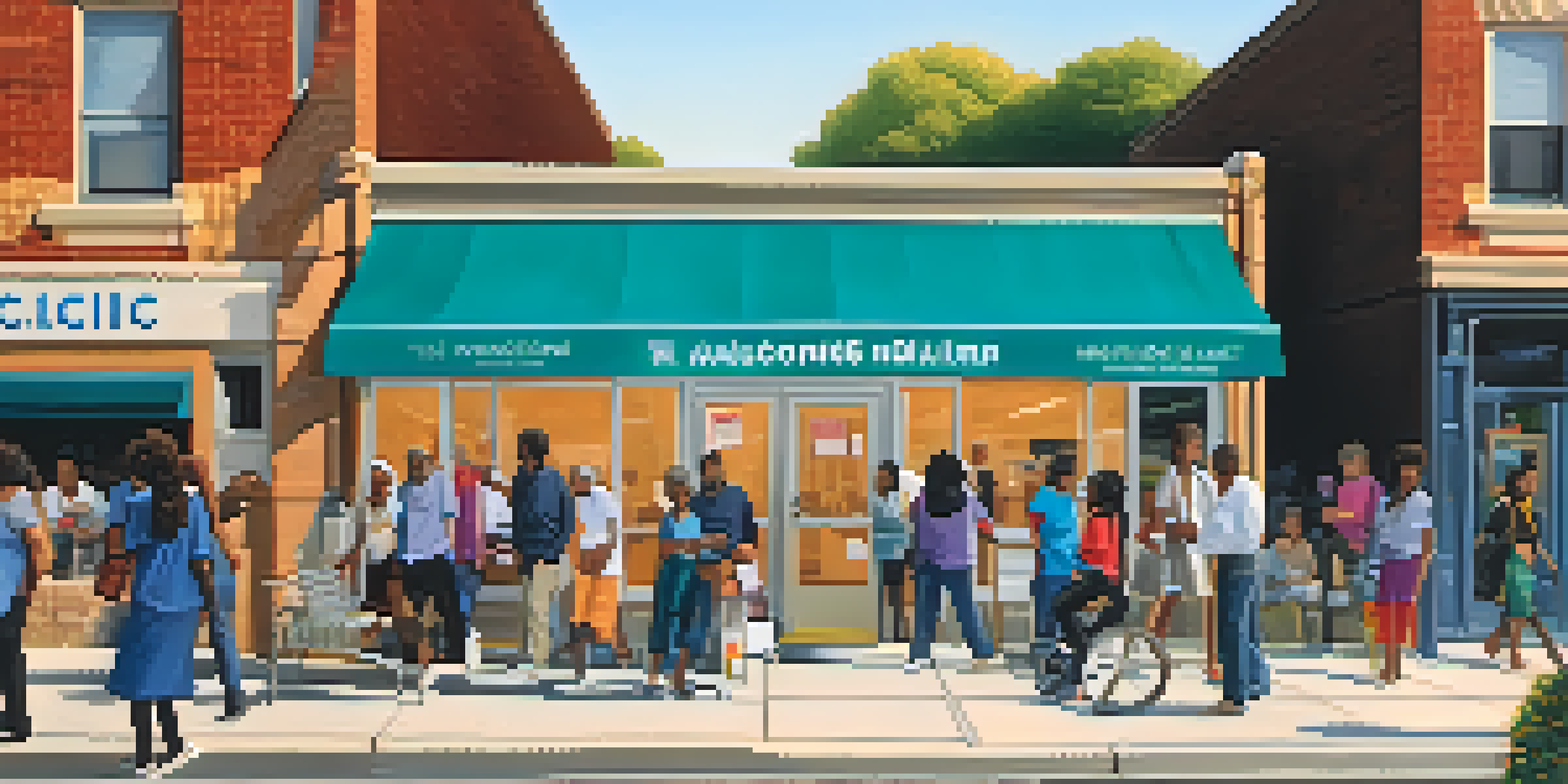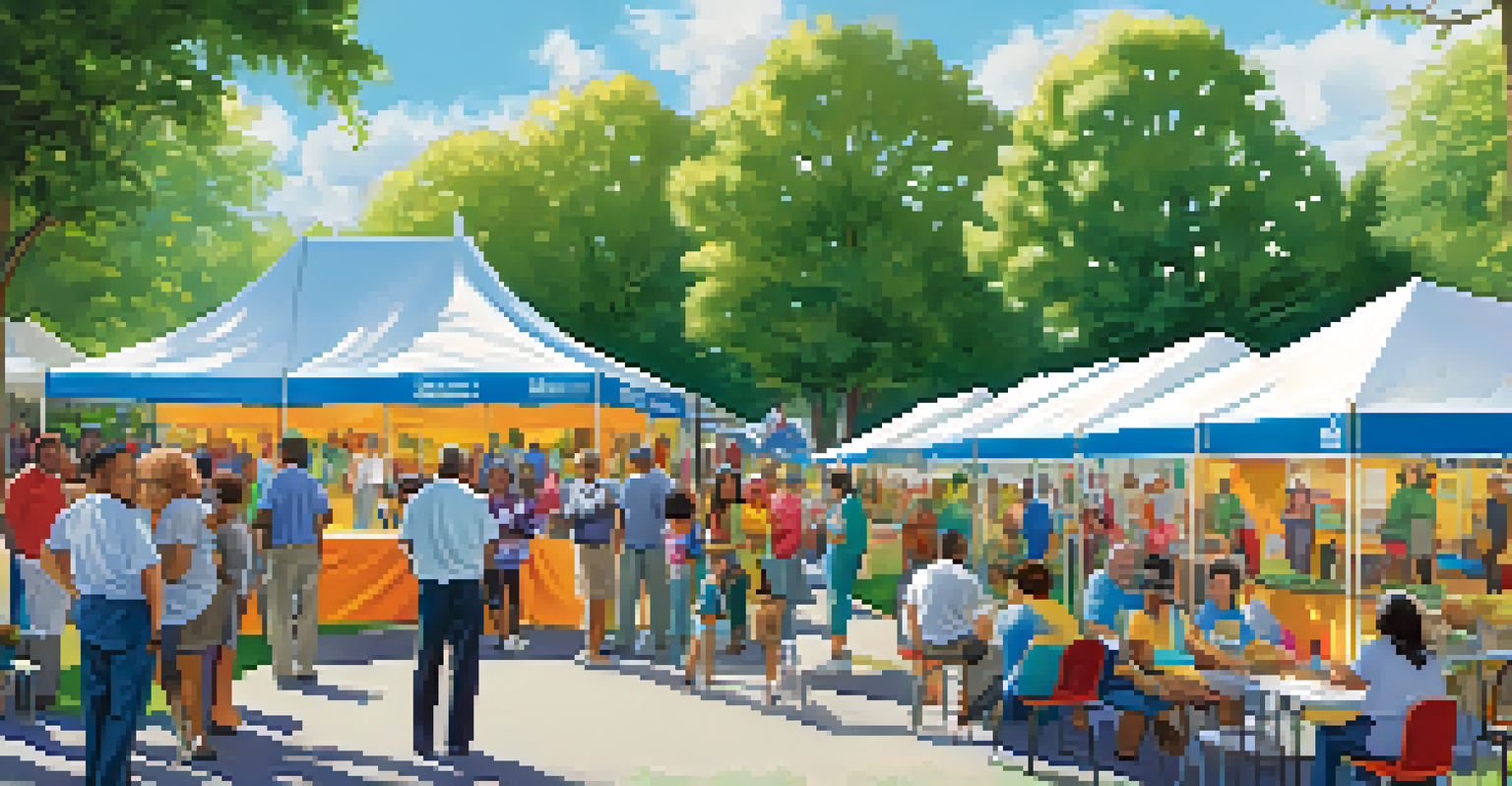Affordable Medical Care Options for Chicago Residents

Understanding the Need for Affordable Medical Care in Chicago
Healthcare costs can be overwhelming, especially in a bustling city like Chicago. Many residents find themselves struggling to make ends meet while trying to access necessary medical services. This growing concern highlights the importance of finding affordable medical care options available in the city.
Health care is a right, not a privilege.
With rising insurance premiums and out-of-pocket expenses, understanding the landscape of healthcare options is crucial. Many individuals may be unaware of the various resources available to help alleviate these financial burdens. By exploring these options, Chicagoans can take proactive steps toward better health without breaking the bank.
Moreover, the impact of the COVID-19 pandemic has further emphasized the need for accessible healthcare. As more individuals seek medical attention, the demand for affordable care has grown, making it essential to stay informed about local resources and options.
Community Health Clinics: A Vital Resource
Community health clinics play a pivotal role in providing affordable medical care in Chicago. These clinics offer services regardless of a patient's ability to pay, making them an invaluable resource for many families. They typically provide a range of services, including preventive care, dental services, and mental health support.

One notable example is the Chicago Department of Public Health, which operates several community health centers throughout the city. These centers are staffed with dedicated professionals committed to ensuring that all residents have access to quality healthcare. By utilizing these resources, individuals can receive the care they need without the fear of exorbitant costs.
Affordable Care Options in Chicago
Residents can access various resources like community clinics and telehealth services to manage rising healthcare costs.
Additionally, many community clinics offer sliding scale fees based on income, further enhancing their accessibility. This means that patients can pay less if they are facing financial difficulties, making healthcare more attainable for everyone.
Telehealth Services: Convenient and Cost-Effective
Telehealth has revolutionized the way we access medical care, especially in urban areas like Chicago. By leveraging technology, patients can consult with healthcare providers from the comfort of their homes, saving both time and money. This convenience is particularly beneficial for those with busy schedules or mobility issues.
The greatest wealth is health.
Many healthcare providers now offer telehealth services at reduced rates, making it an affordable option for many residents. Whether it's a routine check-up or a mental health consultation, telehealth can provide quality care without the associated costs of in-person visits. This flexibility empowers patients to prioritize their health without the stress of financial strain.
Moreover, the rise of telehealth has made it possible for patients to access specialists who may not be available locally. This expanded access ensures that Chicagoans can receive the best possible care without adding significant travel expenses.
Nonprofit Organizations Offering Health Services
In addition to community health clinics, various nonprofit organizations in Chicago provide essential medical services at little to no cost. These organizations often focus on specific populations, such as the uninsured, low-income families, or those experiencing homelessness. Their mission is to bridge the gap in healthcare access and promote overall well-being.
One example is the Heartland Alliance, which offers comprehensive healthcare services, including primary care and mental health support. By partnering with local health providers, these nonprofits can deliver essential services to those in need. Such organizations not only provide care but also advocate for health equity in the community.
Community Support Enhances Access
Local organizations and government initiatives work together to provide vital healthcare services and information to underserved populations.
By tapping into the resources offered by these nonprofits, residents can access vital medical services while receiving support tailored to their unique circumstances. This collaborative approach to healthcare ensures that no one is left behind.
Sliding Scale Payment Options: A Flexible Solution
Sliding scale payment options are an excellent solution for those seeking affordable healthcare in Chicago. Many medical providers, particularly community clinics and nonprofits, offer this payment structure based on a patient's income and financial situation. This flexibility allows individuals to pay what they can afford while still receiving necessary medical care.
For example, a family with a lower income may only pay a fraction of the standard fee, ensuring that healthcare remains accessible. This system helps to alleviate the financial burden on families, allowing them to seek treatment without the fear of overwhelming costs. Understanding and utilizing sliding scale options can lead to better health outcomes for those who might otherwise postpone care due to expenses.
It's essential for patients to inquire about sliding scale options when scheduling appointments. Many providers are willing to work with patients to make healthcare more affordable, emphasizing the importance of communication and advocacy in navigating the healthcare system.
Low-Cost Prescription Programs for Residents
Prescription medications can be a significant expense for many Chicago residents. However, various programs and initiatives aim to lower the cost of essential medications. Community pharmacies and health clinics often participate in programs that offer discounts or even free medications to those in need.
One such program is the Illinois Prescription Drug Discount Program, which allows residents to save on their medications. By presenting a discount card at participating pharmacies, individuals can reduce their prescription costs significantly. This program is especially beneficial for those without insurance or high deductibles.
Sliding Scale Payments for Care
Many healthcare providers offer sliding scale fees based on income, making essential medical services more accessible to families in need.
Additionally, many pharmaceutical companies have patient assistance programs that provide medications at no cost to eligible individuals. By researching and utilizing these options, residents can manage their healthcare expenses more effectively and ensure they stay on track with their medications.
Local Government Initiatives Supporting Healthcare Access
The local government in Chicago plays a crucial role in supporting affordable healthcare access for its residents. Through various initiatives, the city aims to improve healthcare accessibility and reduce disparities among communities. Programs often focus on expanding coverage options and increasing funding for health services.
One notable initiative is the Healthy Chicago 2025 plan, which emphasizes health equity and aims to provide residents with the resources they need to lead healthy lives. By addressing social determinants of health, such as housing and education, the city is working to create a more equitable healthcare landscape.

Residents can benefit from these initiatives by staying informed about available programs and resources. Engaging with local health departments and community organizations can empower individuals to take advantage of the support offered and advocate for their healthcare needs.
Building a Network of Support: Community Resources
Creating a network of support is essential for navigating the healthcare landscape in Chicago. Numerous community organizations and support groups can help residents find affordable healthcare options tailored to their needs. By connecting with these resources, individuals can feel less isolated and more empowered in managing their health.
For instance, local health fairs and community events often provide free screenings, health information, and referrals to affordable care options. These events create opportunities for residents to engage with healthcare providers and learn about the resources available to them. Building relationships within the community can foster a sense of belonging and support.
Additionally, social media and online forums can serve as valuable platforms for sharing information and experiences. Residents can connect with others in similar situations and exchange tips on navigating the complexities of healthcare in Chicago. This collaborative spirit reinforces the idea that no one has to face their healthcare journey alone.